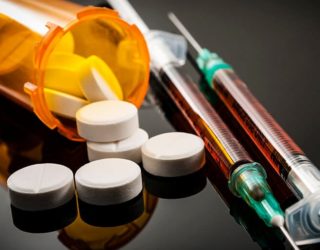Opioids are a class of drugs that include illegal substances such as heroin, as well as some prescription medication like morphine, codeine, hydrocodone, and oxycodone. Opioid abuse has reportedly been increasing through the years, with 11% of American adults using these substances for non-medical reasons in 2016, as compared to 4.7% in previous years. These statistics provide a glimpse into the growing need for opioid addiction treatment programs in the United States.
Opioids Addiction Rehab


Rehab
Seeking Rehab for an Opioid Addiction
Fortunately, numerous rehab centers across the country offer opioid addiction treatment. They specialize in helping patients overcome their condition, either through inpatient or outpatient programs. The treatment methods vary depending on the clinic in question, though most will offer a combination of medical detox and behavioral therapies to increase success rates.
How Long Does a Detox Program Last?
Most patients that follow programs in a specialized rehab facility undergo two types of treatment: medical detox and behavioral therapies. The medical detox period finishes once the withdrawal symptoms improve or subside (usually within one to two weeks.) The therapeutic element of the treatment, however, might take longer than that. The National Institute on Drug Abuse stresses that a patient’s successful rehabilitation not only depends on receiving both medical and psychological care but that a full recovery is only possible after at least a 90-day treatment period.
What Types of Medications Help Treat Opioid Addiction?
When patients go through an opioid withdrawal, they present rather severe symptoms. This is why they require medical supervision throughout the entire process to monitor their health status and avoid possible complications.
While medication cannot treat addiction, some drugs are used during withdrawal in an opioid addiction treatment porgram to help relieve some of the more severe symptoms:
- Agonists that help activate opioid receptors (Dolophine, Methadose)
- Partial agonists that also activate receptors but get a smaller response (Subutex)
- Antagonists that block the receptors and the pleasant effects of opioids (Depade, Revia). This category is not as commonly used as a lot of patients report difficulties in taking the required dosages.
These medications are non-addictive and used to counter the effects of opioids. The type of medication a person will take during their addiction treatment is established based on the individual condition of the person in question.
What Are the Best Therapy Options in Opioid Addiction Treatment?
Centers that offer inpatient treatment can successfully target a patient’s afflictions, both regarding substance addiction and other co-occurring mental conditions. These facilities usually employ a wide variety of treatment methods that help patients overcome addiction, acquire the right tools to handle cravings, and improve their mental state.
Given that each patient’s medical condition and addiction is unique, it is hard to establish which method is best for rehabilitation. Medical professionals prescribe the right course of treatment after a thorough assessment of the patient. However, as mentioned already, it’s been proven that individuals who take part in a complete treatment care (physical, mental, and emotional) have a better chance at recovery than those that undergo rapid programs. Clinics will often integrate several activities into a patient’s rehabilitation plan, such as meditation or outdoor activities.
What Is the National Relapse Rate Among Opioid Users?
Studies show that opioid addicts have a higher chance of relapse than any other drug users. As many as 91% of those going through withdrawal can experience a relapse. Of those, 59% will experience signs of relapse within the first week of sobriety, while 80% can only resist a month without the opioid.
This rather bleak trend is due, in part, to the extreme addictiveness of opioids. Patients may find it extremely difficult to resist inevitable cravings and often give up and take another dose just to relieve their pain. However, you shouldn’t see relapse as a sign of failure. Patients who have relapsed must continue their treatment.
Where Can I Locate an Opioid Addiction Treatment Support Group?
Opiate support groups are located all throughout the country. These groups can help patients establish a support system where members can rely on each other for guidance, encouragement, or help.
Inpatient opioid addiction treatment facilities often employ this method as well. Many patients will attend group therapy sessions where they can share experiences within the group. These discussions often help patients cope with their detox while still committed to the facility. There is also the possibility of continuing such treatment even after discharge.
Get Help Today
Opiate addiction will no doubt have a long road to recovery. Rehab centers can help guide patients through their recovery process and achieve a full rehabilitation.
At Windward Way, our top-notch team of experts has the skill and knowledge base to grapple with addiction, we also embrace the deeply held belief that recovery is meant to be passed along . . . to you! After an adventure-filled and revitalizing stay at our rehab for opioids at Windward Way, most of the people we serve tell us how we were the last-ditch effort that saved their lives.
Through our dually accredited opioid addiction treatment program of recovery, you’ll acquire skills you cannot get at other rehabs: namely, how to effectively manage the physical and/or psychological cravings for opioid-based prescription drugs like Vicodin® or Oxycontin®. You will also discover for yourself the joys of recovery—you will be able to work again, feel joy with your family and friends, and most importantly . . . you’ll be free from the ravages of addiction to opioids.
It seems like we read about opioids in the news almost every day. Opioids (also called “opiates”) have also become a drug of choice because of their “bang for the buck.” Abusing them has serious consequences, though, many with which you may already be familiar. If you are addicted to opioids and want help, we have the expertise and the staff to assist you in finally quitting the abuse of prescription drugs. Windward Way is the opioids addiction rehab you’ve been searching for – Call us right now: []ClinicPhone.
Physicians prescribe opioids mostly for pain control. Here is a list of opioids (with both their brand- and generic names) we most commonly treat at Windward Way:
- Codeine
- Tramadol
- Vicodin® (hydrocodone)
- MS-Contin® (morphine)
- Oxycontin® (oxycodone)
- Fentanyl (such as the Duragesic® patch brand)
- Dilaudid® (hydromorphone)
- Opana® (oxymorphone)
- Demerol® (meperidine)
- Suboxone® (buprenorphine)
- Buprenorphine/Naltrexone
You will find in our opioid addiction treatment program that we strive to be your advocate every step of the way. With our adventure and family programs, as well as our individualized therapy sessions, your experience will be similar to the thousands of other people we have successfully treated, many for an addiction to opioids and other substances.
Withdrawal nearly always accompanies the cessation of opioid use, and it can be uncomfortable. Rest assured, our thoroughly trained and clinically supervised detox staff will ascertain whether opioids detox is right for you.
With a proper opioid addiction treatment program, we know the possibilities for your future are endless, and the sky is literally the limit. Our admissions process isn’t as difficult as you might think, and we’ll be standing beside you, every step of the way. Don’t wait until tomorrow to reach out to Windward Way. You don’t have to go through this process alone. We’re here, right now at (855) 491-7694.




